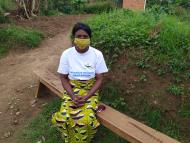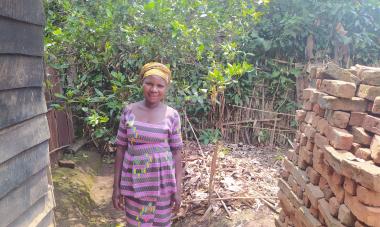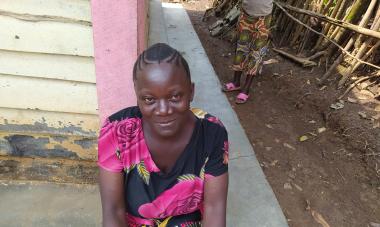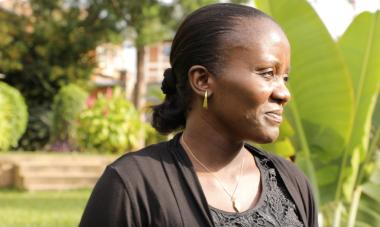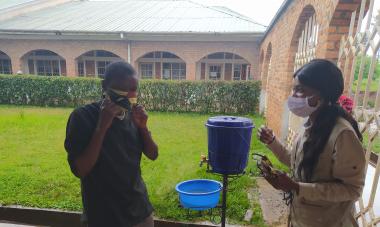After countless days of research and adaptation to evolving circumstances, the next year for the Women for Women International program in the Democratic Republic of the Congo (DRC) is shaping up to be a momentous one. Thanks to our staff in the DRC, the plans for the year include growing men’s engagement activities, strengthened land rights actions, and increased savings for women in the program and beyond.
For decades, the DRC has been plagued by political unrest and consequential institutional frailty. People, especially women, are stripped of their rights to property and land, and armed groups frequently extract natural resources illegally. Nearly 77 percent of the population of the DRC falls under the international poverty threshold ($1.90 US a day) which makes the DRC one of the poorest countries in the world. Banks and access to credit and micro-credit—which are rarely available to the women we serve—are feeble lifelines in the midst of the unrest in the DRC which limits citizens’ ability to invest in businesses and other income-generating activities.
Though men are considered the primary breadwinners in many families, the welfare of the household falls squarely on the shoulders of the women who are often responsible for tending crops to produce food for their families while balancing childcare and household chores. Women in the DRC struggle with famine, disease, food insecurity, and political violence, but in the face of what seem like insurmountable barriers, Congolese women are making progress toward a future in which they are not left behind but are leaders.
Saving from Home
When COVID-19 struck, women in the DRC felt its consequences sharply. A national lockdown left many unable to leave their homes and the national economy deteriorated. Food insecurity became an even larger threat to the livelihoods of people across the country.
While working to stabilize in the face of the pandemic, our staff prioritized the search for ways to ensure participants have access to income and savings, even while at home. To build this solution, our DRC team looked outward. A community banking and savings application called DreamSave, that allows women to participate in virtual Village Savings and Loan Associations (VSLA), has proved a lifeline in Rwanda, and our staff see potential for the project in the communities where we work in the DRC.
The DreamSave app will be piloted in the DRC in the coming months with the help of institutional donors. The DRC is a fundamentally different context than Rwanda and will require meticulous adaptation and work with participants to ensure they have everything they need to establish their own financial autonomy. Our DRC staff has been working tirelessly to construct the pilot amidst existing infrastructure barriers and new challenges presented by COVID-19. VSLAs remain a cornerstone of our programming, and our integration of a health micro-insurance facet of the VSLAs will be developed in the coming years so that the women we serve have ready access to healthcare and resources.
With the pandemic serving as both an economic and health crisis, these savings allow women to invest in the future of their businesses and families, as well as access important resources for their well-being.
Inheriting the Future
This year, our DRC office will be implementing a long-planned land rights and awareness project funded by the USAID RISE grant. When women attempt to reclaim their land and ownership rights, they frequently suffer gender-based violence, and the project focuses on land rights for women in a way that mitigates this increased risk for women.
After intensive community awareness initiatives and collaboration with local leadership, we have identified over 280 women interested in being part of the project that will provide them a local land title, and a group of Change Agents will be trained in the land demarcation process alongside local land authorities in the DRC. Through the Change Agents’ advocacy, local leaders have agreed to processes that protect women’s land rights with paperwork that proves their ownership. Women seeking land reclamation sometimes face retaliation; recognizing this, DRC staff will continue to focus heavily on men’s engagement and rights awareness-raising in the communities in which we work to supplement land demarcation and protect women’s safety.
Agriculture is the backbone of the country's economy, employing about 70 percent of the labor force and contributing a large share of GDP. Ongoing conflicts, inter-community tensions over land issues and climate change problems have hampered agricultural production and led to serious food security problems. In the past year, our team has found that mixed leadership in advocacy is more effective. We have found that when women’s advocacy networks and men’s discussion groups advocate together on an issue, it is more likely to create change. The model has been adopted and it is being implemented in most of our projects.
In 2020, our DRC team conducted couples’ dialogues in which women could attend a moderated session between her and a man in her life like her husband, uncle, or father. Through the results of the recently concluded randomized control trial in our DRC program, we’ve learned that it takes a longer, more sustained intervention to create a positive and lasting outcome in women’s relationships with their male allies. This year, we hope to continue these dialogues and to include every participant in our program. There will be three sessions per couple, held throughout the year.
Growing Forward
In the next few years, our team in the DRC will pilot several projects based on cross-learning and successes in other country offices. In Rwanda and Nigeria, business competitions have been held for graduates to present business models and plans for consideration to win business coaching and a capital asset. We want to use this model in 2022 to give participants the tools to create greater stability in their businesses and provide start-up capital.
In the coming months, we look forward to expanding into three new communities and have already enrolled several women in those areas. By 2024, our team aims to ensure that the socioeconomic conditions of 15,000 of the most marginalized women and 5,000 male allies are improved through an integrated and diversified program that includes social and economic empowerment, men’s engagement activities, and community.
Technology and new programming will provide a sturdy basis for the next several years of our DRC program, but the change driven by the community that the participants and staff share. In the face of some of the most dangerous circumstances on Earth, the women we serve in the DRC are building a future for generations to come.

